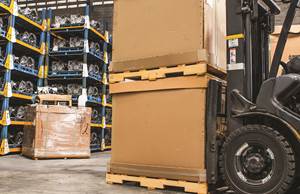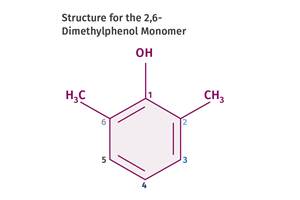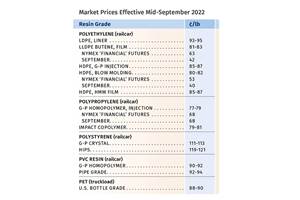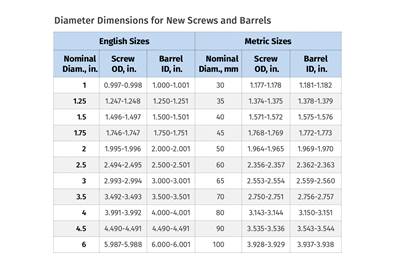Disposable Packaging Goes 'Natural'
A compostable "natural" composite developed by EarthShell Corp. is likely to have a broad impact on disposable packaging markets, company sources say.
A compostable "natural" composite developed by EarthShell Corp. is likely to have a broad impact on disposable packaging markets, company sources say. At EarthShell's inception in 1992, it emphasized the potential of its blend of ground limestone, potato starch, and recycled paper fiber for making analogs of extruded polystyrene foam bowls, plates, and hinged containers. Now, with its rigid fast-food containers taking off, the company's focus has broadened into food-service film (replacing film/paper laminates), hot and cold drink cups (replacing EPS and coated paper), rigid sheet (replacing paperboard), and even injection molded disposables. Within two years, officials expect these end-uses to be commercialized.
Although EarthShell's composite is not truly plastic, it often incorporates a biodegradable polymer as a moisture-barrier film or additive. So success in rigid packaging does help plastics win back ground lost to paper a decade ago, asserts Vincent Truant, EarthShell's president. He cites agreements assigning rights to partners to make EarthShell bowls, plates, clamshells, and cups. These packages are "baked" in a process analogous to waffle making, using dedicated equipment built by Detroit Tool and Engineering.
EarthShell has issued licenses for rigid packaging to Sweetheart Cup Co. in Owings Mills, Md.; Huhtamaki Oyj in Finland; and Green Packaging SDN BHD in Malaysia. Each has regional rights in fast-food, retail, and other sectors. Green Earth Packaging (GEP) in Dallas has been granted rights to supply discount stores and government agencies. EarthShell receives a 20% royalty on all sales.
Thomas Uleau, Sweetheart's vice chairman, called the agreements "one of the most significant developments in the food-service industry in years." Sweetheart is to begin production by mid-2003, and expects sales to reach $500 million a year by 2007. Green Packaging SDN plans to install five lines in Malaysia and make 1 billion units (mostly noodle bowls) by 2003. GEP will spend $10 million on five new lines in Texas that will start up in mid-2003.
Wraps & cups are hot
An alliance of EarthShell and DuPont Packaging & Industrial Polymers is focused on sandwich wraps. DuPont has global rights to sell food-service film in a $1-billion/yr market. Wrap can be made on existing blown- or cast-film equipment, largely because of the addition to the EarthShell formula of DuPont's Biomax polyester.
This biodegradable thermoplastic imparts good foldability and drapability, aids printing, and adds moisture barrier. The wraps have been tested in several cities and at restaurants in eight national parks. Potential exists for replacing paper in other printed, disposable food applications as well.
Interest in composite hot cups to replace EPS and paper is intense, says John Nevling, EarthShell's director of product management. The agreement with Sweetheart includes cups and other rigid packages. Composite hot cups offer potential cost savings over EPS. Ingredient costs are around 3¢/lb for limestone and 22¢/lb for potato starch. Composite hot cups provide a "more pleasing feel to hands and lips" than EPS, adds Nevling. Versus paper, they are lighter and superior insulators (water in the dough foams during processing).
One challenge is a deeper draw than for other rigid packages. During vacuum forming of the biodegradable film lining, it is important to maintain uniform wall thickness and avoid wrinkling. Officials say the composite hot cups are more reliable than other cups because the film forms a continuous membrane to support the substrate at points where it might crack or pinhole.
Meanwhile, a rigid sheet made of EarthShell composite is being tested as a paperboard replacement in food and non-food uses. Work is also under way to adapt the composite for injection molding of disposable knives, forks, spoons, and coffee stirrers.
Related Content
The Fantasy and Reality of Raw Material Shelf Life: Part 1
Is a two-year-old hygroscopic resin kept in its original packaging still useful? Let’s try to answer that question and clear up some misconceptions.
Read MoreTracing the History of Polymeric Materials: Polyphenylene Oxide
Behind the scenes of the discovery of PPO.
Read MorePrices of Volume Resins Drop
Price relief is expected to continue through the fourth quarter for nine major commodity and engineering resins, driven by widespread supply/demand imbalances.
Read MoreWhat's the Allowable Moisture Content in Nylons? It Depends: Part 2
Operating within guidelines from material suppliers can produce levels of polymer degradation. Get around it with better control over either the temperature of the melt or the barrel residence time.
Read MoreRead Next
Troubleshooting Screw and Barrel Wear in Extrusion
Extruder screws and barrels will wear over time. If you are seeing a reduction in specific rate and higher discharge temperatures, wear is the likely culprit.
Read MoreHow Polymer Melts in Single-Screw Extruders
Understanding how polymer melts in a single-screw extruder could help you optimize your screw design to eliminate defect-causing solid polymer fragments.
Read MoreAdvanced Recycling: Beyond Pyrolysis
Consumer-product brand owners increasingly see advanced chemical recycling as a necessary complement to mechanical recycling if they are to meet ambitious goals for a circular economy in the next decade. Dozens of technology providers are developing new technologies to overcome the limitations of existing pyrolysis methods and to commercialize various alternative approaches to chemical recycling of plastics.
Read More

























